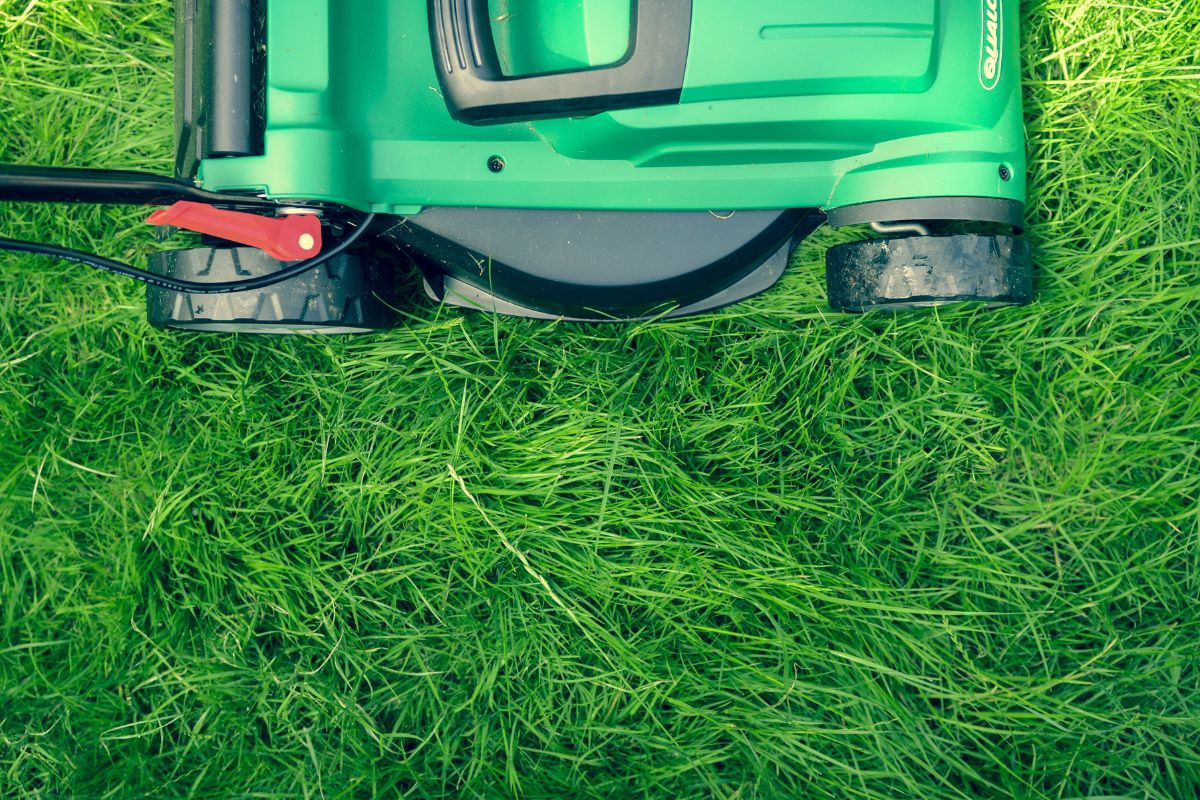If you’ve ever been working on your lawn only to have your electric mower suddenly shut off due to overheating, then you know how frustrating this can be!
But why could an electric lawn mower be overheating?
This is one of the questions people ask very often, especially if the weather’s hot and humid – perfect description of the summertime! That time of the year that brings out the green thumb in many of us who are proud of our yards and gardens!
In this article, I’ll explore all the reasons why your electric mower may be overheating, and what steps you should take to prevent it from happening again.
Common Causes Of Overheating
There are a number of reasons your electrical mower could be overheating.
Blockages In The Blades Or Motor
This is the most common cause of an electric lawn mower overheating. These blockages could be due to leaves, twigs, or other debris getting stuck while working with the machine.
Poor Ventilation
Inadequate ventilation around the engine can also lead to increased temperatures within the device which will then overheat if left unchecked
Faulty Wiring
Additionally, faulty electrical wiring may create extra heat inside the body of your lawn mower due to inefficient current flow.
Poor Maintenance
Not properly maintaining and cleaning your lawn mower regularly can add up dust particles on the internal components causing them to become blocked.
Let’s discuss more on each cause, factor by factor.
Obstructions In Blades Or Motors
Sometimes, the root cause of an electric lawn mower overheating is as simple as blades or motors that have obstructions. Here are the common causes of blade and motor obstruction.
Blade Wear
Blades become dull over time due to regular use, causing blade blockages. This reduces their ability to cut grass efficiently.
In terms of motor obstructions, motors may eventually overheat if they are used too frequently without proper maintenance or repair.
Blade Clogs
Debris such as twigs, leaves, and dirt can easily build up in the blade area and prevent it from cutting properly, causing blade obstruction.
Dirt buildup in the motor can also impede its performance, causing motor obstruction, which eventually leads to overheating issues.
These types of blockages are fairly easy to identify by inspecting both the blades and motor closely for any signs of damage or debris buildup. If you find either one is causing problems, then fix it right away so your mower won’t suffer any further strain!
Now let’s move onto another possible issue – faulty electrical wiring.
Faulty Electrical Wiring
If your electric mower is overheating, it could be due to faulty electrical wiring. Here’s a quick list of things you should look for when diagnosing an electrical wiring problem.
How To Diagnose Electric Wiring Problems
- Check for loose or damaged wires
- Look for signs of corrosion or frayed insulation
- Make sure connections are secure and properly insulated
- Inspect any junction boxes or circuit breakers for potential hazards
NOTE: It’s important to take safety into consideration when dealing with electrical wiring problems on an electric mower.
- Always wear protective gear such as eye protection and gloves
- Avoid working near water sources
- Never try to fix a live wire without first shutting off power from the main breaker box.
By following these simple tips, you can help ensure that your electric lawn mower has safe and reliable electrical wiring. Coming up next, how to maintain an electric mower!
Proper Electric Mower Maintenance
How should I maintain my mower? Here are the tips.
Tips For Proper Maintenance
- Check for blade obstruction before each use
- Inspect all electrical wiring routinely
- Make sure there’s adequate ventilation around your machine
- Clean out excess dirt from motor parts
- Perform regular oil changes according to manufacturer instructions
With these simple steps taken care of every now and again, you’ll be able to keep your electric mower running cool – pun intended! Let’s talk about ventilation as a cause of overheating electric mower.
Inadequate Ventilation
The heat of an electric lawn mower can be like a ticking time bomb, ready to explode into overheating if not given proper ventilation and cooling.
Poorly ventilated spaces are the perfect environment for this little time-bomb to fizzle out in smoke and flames. Without adequate airflow around its motor, an electric mower can quickly build up enough internal heat to cause serious damage or even catch fire.
The key is making sure that there’s plenty of air circulating around the motor while it’s running – allowing hot air to escape and cooler air to replace it.
Good ventilation is essential when using any kind of machine with moving parts, but especially so with electrical ones as they generate more heat than their mechanical counterparts.
If you’re having trouble keeping your electric mower cool:
- Try opening windows or doors in the garage or shed where you store it
- Consider investing in a fan or two
- Or just take frequent breaks during longer mowing sessions to allow the engine some time to rest and dissipate built-up heat energy.
Taking these precautions will help ensure that your beloved electric mower doesn’t become victim to excessive temperatures before its job is done.
Conclusion
Purchasing an electric lawn mower can be a great way to keep your yard looking neat and tidy. But it’s important to keep in mind that an electric mower can overheat if it is not properly maintained or used on wet grass.
To avoid this issue, make sure you’re selecting the right type for your needs and checking for any signs of wear and tear before each use. Replace blades regularly, don’t overload with too much grass at once, and only use the machine on dry surfaces.
As the saying goes “An ounce of prevention is worth a pound of cure,” take some time now to ensure your electric mower doesn’t give you any trouble down the line!
Overall, investing in an electric mower can save you time, money, and energy when compared to traditional gas-powered models. With correct maintenance and usage practices in place, you can rest assured that your electric model will last season after season without overheating. So, get out there and start tackling those weeds like a pro!
Frequently Asked Questions
What Type Of Electric Mower Should I Buy?
There’s no clear-cut answer to this. The choice is all yours! But there are a few issues you should consider to ensure you make the best choice for you.
When evaluating different models, consider factors such as cutting width, speed settings (if adjustable), noise levels, weight capacity, ease of use/maintenance, warranty coverage and price point. If possible try out several before committing to one model – this way you’ll get a good sense of how well they perform in real life situations.
Also take into account any accessories included (batteries/chargers) as these may influence your overall decision too.
Finally don’t forget about quality customer service – if something goes wrong down the line make sure that technical support is easily accessible should any issues arise whilst using the machine.
What Is The Best Way To Store My Machine?
Storing an electric or lawn mower is essential for safety and longevity. For anyone who owns one of these machines, this means taking the time to understand proper storage techniques and implementing them properly. With the right steps, you can ensure your electric mower remains in top condition all season long.
Start by cleaning off any debris from the machine before storing it away. This includes clearing grass clippings, leaves, dirt, and other items that may have gathered throughout the cutting process.
When it’s time to store the mower, make sure you place it in a dry place with plenty of ventilation as moisture buildup could cause rusting or corrosion over time. It’s best to avoid direct sunlight since extreme temperatures are never good for electronics either. If storing outside cover the unit with a weatherproof tarp so no rain or snow falls on it directly between uses.
Additionally, if you’re planning on keeping your mower stored for more than a few weeks consider plugging it into a surge protector which helps maintain battery life and protect against power outages or fluctuations in electricity levels.
How Often Should I Replace The Blades?
For the average homeowner, it’s best to replace those blades every year, or every few months if you have a large yard. If left unchanged for too long, they could cause serious damage to both your lawnmower motor and your lawn itself.
Luckily, it’s not such a difficult task. First, you’ll want to locate the screws that hold the blade cover in place and remove them with a screwdriver or wrench. After that, take off the old blade and check if there are any nicks on its edge – replacing worn out blades will give you more bang for your buck when cutting grass!
Once you have checked and installed new blades properly, put the blade cover back on and secure it with screws. Be sure to double-check everything to ensure that all parts are securely fastened before powering up the mower again.
How Much Power Does An Electric Model Use?
Different models of electric mowers use different wattage or voltages, so it’s essential to check the specs before purchase. The wattage of an electric mower will determine its overall energy consumption, or draw from the electrical outlet when in operation.
But generally, most electric lawnmowers require between 600-1000 watts per hour, depending on their size and functionality.
You’ll want to make sure the voltage of the electric mower matches what’s available at home – usually 120V or 240V. If it doesn’t match up then your mowing job could be cut short by a power outage if the voltage isn’t compatible!
Can I Use An Electric Mower On Wet Grass?
Yes, but it depends on the type of electric lawn mower you have and the conditions in which you plan to operate it. Despite popular belief, there are certain types of electric mowers designed specifically for cutting wet grass. These models are equipped with special protective features such as waterproof casings.
The key here is making sure your particular model of lawnmower was created with wet-grass mowing capabilities in mind. Many brands now offer models built just for this purpose, so make sure to do some research before investing in one if that’s what you need.
But even if yours isn’t made for damp conditions, most conventional electric lawnmowers will still work fine provided that the ground isn’t too soggy and doesn’t cause them to get stuck while trying to navigate through thick patches of turf. Just remember: if in doubt, keep away from moisture!
Photo by Daniel Watson.


